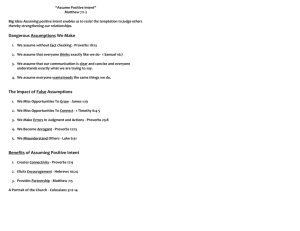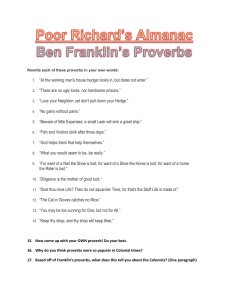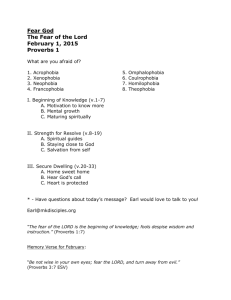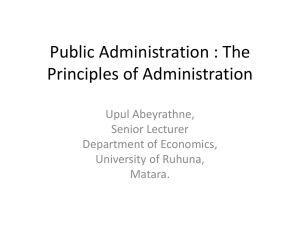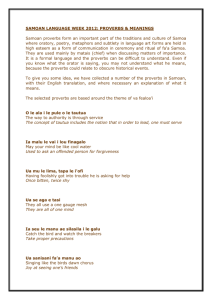Document 10465485
advertisement
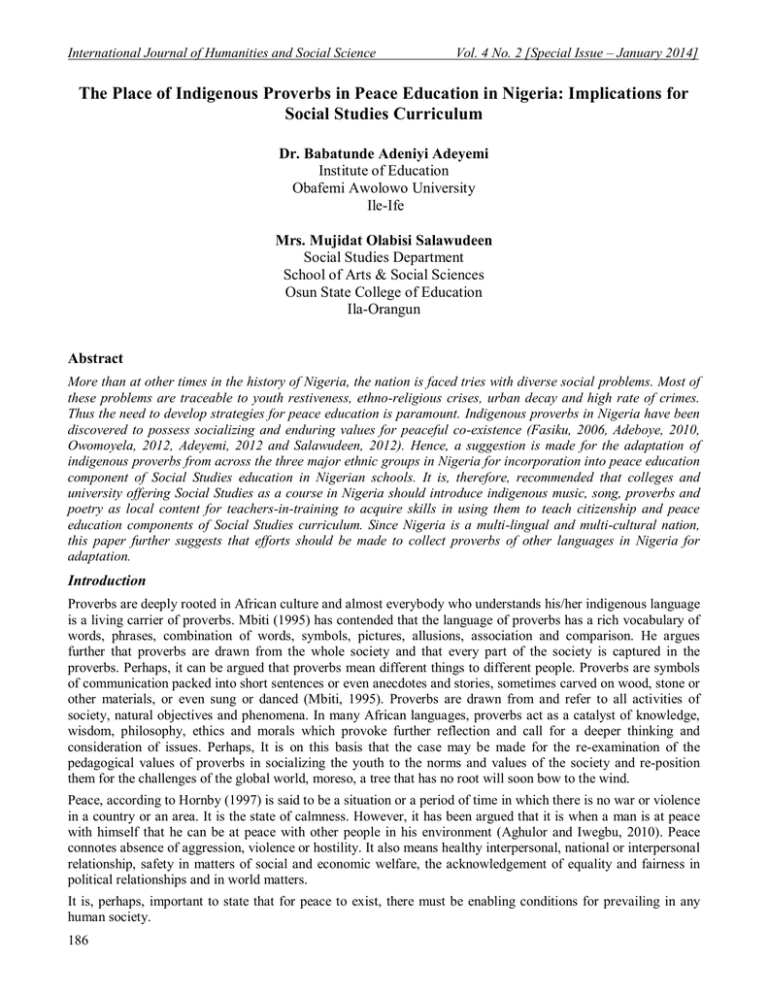
International Journal of Humanities and Social Science Vol. 4 No. 2 [Special Issue – January 2014] The Place of Indigenous Proverbs in Peace Education in Nigeria: Implications for Social Studies Curriculum Dr. Babatunde Adeniyi Adeyemi Institute of Education Obafemi Awolowo University Ile-Ife Mrs. Mujidat Olabisi Salawudeen Social Studies Department School of Arts & Social Sciences Osun State College of Education Ila-Orangun Abstract More than at other times in the history of Nigeria, the nation is faced tries with diverse social problems. Most of these problems are traceable to youth restiveness, ethno-religious crises, urban decay and high rate of crimes. Thus the need to develop strategies for peace education is paramount. Indigenous proverbs in Nigeria have been discovered to possess socializing and enduring values for peaceful co-existence (Fasiku, 2006, Adeboye, 2010, Owomoyela, 2012, Adeyemi, 2012 and Salawudeen, 2012). Hence, a suggestion is made for the adaptation of indigenous proverbs from across the three major ethnic groups in Nigeria for incorporation into peace education component of Social Studies education in Nigerian schools. It is, therefore, recommended that colleges and university offering Social Studies as a course in Nigeria should introduce indigenous music, song, proverbs and poetry as local content for teachers-in-training to acquire skills in using them to teach citizenship and peace education components of Social Studies curriculum. Since Nigeria is a multi-lingual and multi-cultural nation, this paper further suggests that efforts should be made to collect proverbs of other languages in Nigeria for adaptation. Introduction Proverbs are deeply rooted in African culture and almost everybody who understands his/her indigenous language is a living carrier of proverbs. Mbiti (1995) has contended that the language of proverbs has a rich vocabulary of words, phrases, combination of words, symbols, pictures, allusions, association and comparison. He argues further that proverbs are drawn from the whole society and that every part of the society is captured in the proverbs. Perhaps, it can be argued that proverbs mean different things to different people. Proverbs are symbols of communication packed into short sentences or even anecdotes and stories, sometimes carved on wood, stone or other materials, or even sung or danced (Mbiti, 1995). Proverbs are drawn from and refer to all activities of society, natural objectives and phenomena. In many African languages, proverbs act as a catalyst of knowledge, wisdom, philosophy, ethics and morals which provoke further reflection and call for a deeper thinking and consideration of issues. Perhaps, It is on this basis that the case may be made for the re-examination of the pedagogical values of proverbs in socializing the youth to the norms and values of the society and re-position them for the challenges of the global world, moreso, a tree that has no root will soon bow to the wind. Peace, according to Hornby (1997) is said to be a situation or a period of time in which there is no war or violence in a country or an area. It is the state of calmness. However, it has been argued that it is when a man is at peace with himself that he can be at peace with other people in his environment (Aghulor and Iwegbu, 2010). Peace connotes absence of aggression, violence or hostility. It also means healthy interpersonal, national or interpersonal relationship, safety in matters of social and economic welfare, the acknowledgement of equality and fairness in political relationships and in world matters. It is, perhaps, important to state that for peace to exist, there must be enabling conditions for prevailing in any human society. 186 The Special Issue on Contemporary Research in Behavioral and Social Science © Center for Promoting Ideas, USA First, there must be a culture of peace because any society that has culture of violence will hardly appreciate peace (Aghulor and Iwegbu, 2010). Other conditions for peace include justice in all areas democratic acquisition, dispensation, and utilization of power among members of a given community, state or nation, amicable resolution and management of conflicts; the development of common security that does not rely on threat or use of violence, the pursuit of collective and individual goals through a non-violent means (Aghulor and Iwegbu, 2010). These conditions are not in any way exhaustive, but are major conditions for peace to exist in human societies. However, other conditions for peace may be culturally determined. In order to achieve peace, the citizens need education on how to maintain peace. Education for peace, like socialization, must be facilitated through the agencies of the school, the family, the religious bodies, the peer group and the mass media. It is pertinent to state that peace education is very essential in that over the years, its content has been organized into a body of knowledge by various scholars (Igbuzor, 2010). In this paper, the relevance of proverbs to teaching human values and enduring peace and the implication of this attempt for Social Studies curriculum shall be examined. Specifically, the paper shall examine: 1. The concept of peace education. 2. The place of indigenous proverbs in peace education in the society. 3. Implication of the indigenous proverbs for curriculum development in Social Studies education. Concept of Peace Education Peace education is both a philosophy and a process that is concerned with the acquisition of knowledge and peace-making skills. The primary purpose of peace education is to expose the learners to alternative non-violence ways of dealing with conflicts. Perhaps, it is on this basis that Aghulor and Iwegbu (2010) describe peace education as an educational programme meant to inculcate into citizens the relevance of peace in the individual, community and national life. It underscores various mean of achieving enduring and sustainable peace in human societies. The present spate of national insecurity occasioned by ethno-religious crises; youth unrests and agitations for equitable distribution of national resources has made it imperative, more than at any other time in the chequered history of this nation to tow the path of peace education. A cursory look at literature in the field of peace education reveals that it is a growing field with more interest from the scholars. Curriculum in peace education covers wide of topics including the history and philosophy of education. (Harris and Morrison, 2003); the dialectic between “negative” and “positive” peace ( Galtung, 1996); gender and militarism (Reardon, 2001), conflict resolution education (Toh and Cawagas, 1991). The above topics, perhaps, confirm the dynamism and multidisciplinary nature of peace education. It thus requires that its implementation as a school subject requires the incorporation into Social Studies education which is an equally dynamic and multi-disciplinary subject with topics subsuming the content of peace education. In introducing peace education into Nigerian schools, it is important that its aim should be to nurture knowledge, values, behaviors and capacities to confront violence which is threatening the corporate existence of Nigeria. Peace education is a problem-posing education that attempt to build in every person the universal values and behavior on which a culture of peace is nurtured, including the development of non-violent conflict resolution skills and “a commitment to working together to realize a shared and preferred future” (Kester, 2009). Rather than promoting culture of confrontation and armed resolution to conflicts, peace education promotes dialogues, mediation and artistic endeavors in order to transform a system with violent orientation to a culture of peace. Peace education, therefore, teaches the values of self-respect, understanding and non-violence, presents skills for analyzing international conflicts and educate for alternative security systems (Kester, 2009). More than at any other time in the history of Nigeria, the introduction of peace education in our schools has become necessary. This is to ensure that the nation, through education, finds ways of addressing the root cause of conflicts that are responsible for national insecurity. Igbuzor (2011) has identified that for sustainable peace in any society; there must be justice, just and accountable governance, protection of human rights, equitable distribution of resources and peace and security education. The absence of some of these factors has led to and sustains violence in Nigeria. Hence, the need to urgently introduce peace education has arisen. In doing this, the next section looks at peace education through indigenous proverbs as an alternative in line with the saying of our people that “ oro tutu nii yo obi lapo, oro buruku nii yo ida ni aako meaning, “that good words (peaceful resolution of issues) bring out kolanut from pocket, while confrontation brings about sword from its sheath”. 187 International Journal of Humanities and Social Science Vol. 4 No. 2 [Special Issue – January 2014] The impact of this Yoruba proverb underscores the need for dialogue, mediation and negotiation to resolve issues peacefully for development. Indigenous Proverbs and Peace Building in Nigeria Proverbs are the vehicle with which socio-cultural and philosophical thoughts underlying social values, issues, ethnic and religion are transmitted across generation. Thus, Owomoyela (2012) opines that language development and socialization among the Yoruba people of South-Western Nigeria are done through the use of proverbs. He avers that the Yoruba people “approach with deliberate care, taking great pains to avoid careless or thoughtless statement, whose damage might outlast lifetimes”. Also, among the Igbo of South-Easter Nigeria, Achebe (1958) while underscoring the importance of proverbs to Igbo word-view and culture states in his maiden novel, Things Fall Apart, states that “proverbs are the oil with which words are eaten”. Among Hausa and other ethnic groups constituting Nigeria, proverbs are a veritable tool for education in values, culture and social attitudes, especially in the indigenous educational practices. It could, therefore, be asserted that prior to the European invasion of the African Continent of which Nigeria is a part, indigenous educational system existed. Mara (2006) contends that African traditional education apart from focusing on vocational training, aimed at inducting the members of society into activities and mode of thought that conformed to the norms and values of the society. Mara further observes that African societies were noted for their cultural heritage which was preserved and transmitted from generation to generation through a system of traditional education. According to Okoro (2010), traditional education took place within the family by means of stories and proverbs as the occasion presented itself and acquisition of functional life skills. Children were taught the virtues of living together peacefully under the same roof. The principle of community living centered around themes of moderation, solidarity, respect for truth and willingness to work and suffer for self and community advancement, respect for authority, sense of honesty, modesty, tolerance, sense of goodness and kindness, love of one’s neighbour, respect for life and so on (Ntahobari and Ndayiziga, 2005, Okoro, 2010, Falade, Adeyemi and Olowo, 2011). Proverbs are central to indigenous education and various themes of traditional education were imparted through the vehicle of proverbs. Underscoring the importance of proverbs in traditional societies, Akinmade (2012) notes that in African societies, proverbs have been and will continue to be of great advantage to man. He argues that; “It (proverb) is the most powerful and potent vehicle for culture dissemination from one generation to the other. Proverbs express the nature of African wisdom as they perform diverse functions, ranging from bringing peace ------- where there is conflict and misunderstandings, giving hope where there is despair and light where there is darkness in human relationships and interactions (Akinmade, 2012; 128. Thus, in African societies, proverbs are essential for a deep understanding of the communal bases of the society and the bonds which tie them together.Perhaps, one a major way of indigenous socialization of children and youth for peace is (Ntahobari and Ndayiziga, 2005; Okoro, 2010; Akinmade, 2012). Selected Nigerian proverbs that could form part of the basis of indigenous peace education. Indigenous proverbs could serve as basis for indigenous model on peace education in Nigeria. All ethnic groups in Nigeria are rich in culture, language and values which are enduring. Proverbs from three major ethnic groups in Nigeria; Hausa, Igbo and Yoruba are identified with a view to bringing all their values of moderation, modesty, tolerance, sense of goodness, kindness, good neighbourness and respect for life which have been identified as essentials for peace education and peace building (Ndayiziga, 2005; Okoro, 2010). Hausa proverbs used in this section are selected from the collections of Marrick (1905) who provided the proverbs with translations. On values of good leadership and moderation the proverb says “Babba juji ne, kowa ya zo saara sai ya zubar” Meaning; “The chief (or head of the family) is like a dust-heap, everyone comes with his sweepings and deposits on them “This proverb emphasizes the values of good leadership, tolerance and good neighbourliness as criteria for harmonious living. A leader from Hausa viewpoint is, therefore, a person who is ready to serve his people and tolerate them in order to achieve the purpose of his leadership. On modesty, tolerance, and appreciation of individual differences, irrespective of race and colour, two Hausa proverbs from the collectives of Merick (1905) are selected here; (a) “Halli n zani duchi ne, ba mai iya shafewa, ba mai iya shafeyslii”” Meaning “Disposition (or man’s nature) is like the grain of stone, no one can rub it out or efface it”. 188 The Special Issue on Contemporary Research in Behavioral and Social Science © Center for Promoting Ideas, USA This proverb highlights the importance of individual differences; tolerance and understanding of other people. Based on these, the national diversity on issues of ethnicity; religion and politics could be understood because the realities of differences in character, attitudes and behaviors are underscored. (b) Following this analysis is another proverb, “Albassa ba ta balli n rua” Meaning “The nature of onion and water are different, though one grows by the help of the other”. Apart from understanding individual differences and principle of ethnic diversity, it also emphasizes the symbiotic and interdependent relationships among ethno-religious divides and political differences. Despite the differences, for peace to reign, the ethnic nationalities making up Nigeria must live together. Thus, the proverb can be adapted to treat the principle of unity in diversity. Perhaps, another principle of peace education prominent in Hausa proverbial world-view is that every individual has his peculiarities which have to be understood for peace to reign. Proverbs extolling this virtue are: (a) “kowa de ramanshi, mai ido daia ya leka buta” Meaning “everyone has his peculiarities, a man with one eye squints down the mouth of a buta”. “Buta” means “water bottle”. This proverb lays emphasis once again on tolerance understanding the individual differences and more importantly the basic peculiarities that ties various ethnic groups in Nigeria together. (b) Furthermore, peaceful living requires good disposition which sometimes may not go with western or Islamic education. Thus, proverb states: “Halli ya rigaya foro, halli n mutum kowa de nasa”, meaning: “A man’s disposition or nature precedes his education and everyone has his own”. Thus, individual disposition or nature determines his attitudes to basic issues such as ethnicity; religion, politics and family living for sustainable peace.Therefore, the proverb emphasizes a full understanding of human attitudes, behaviours, and values because they determine man’s reaction to issues and his readiness to engage in an action. In order to foster good disposition, therefore, there must be positive socialization to indigeneous peace education. Igbo is another major ethnic group in Nigeria. Igbo proverbs used in this paper are collected by Ogbalu (1965) translated by Pritchett (downloaded from http// www.columbiaeduc./itc/mealac/pritchett/oofwp/igbo/proverbs/007-016. Only the translations are available at the site. On modesty and moderation, a translated Igbo proverb says: “When a strong man is constantly praised, he fights empty handed and is carried away in a worn-out basket”. Thus, the proverb hammers on the themes of moderation and modesty. Perhaps, this proverb summarises the major basic content of indigenous peace education among Igbo people. A person who is full of himself; does not listen to other people’s advice and extols in the belief that he knows the best, not only causes horror to himself but to the community. These themes are, perhaps, exemplified by Achebe in Things Fall Apart where Okonkwo epitomizes vices of pride; over-confidence and selfpraise which eventually led to his destruction. Understanding one’s self-limitation is another theme of indigenous peace education. An Igbo proverb,; “ If the rat falls into the water with the lizard, the lizard will get dry but the rat will not”. The proverb underscores the importance of behaving according to their true nature rather them imitation which will in the end leads to conflicts. In addition, the theme of co-operation is extolled by the proverb “One hand does not tie a package”. Which stresses the importance of individual contributions towards the achievement of collective goals? Perhaps, an important Igbo proverb on the theme of caution is “The chicken advises her children to look up because that is the place from which comes the death that kills them”. This proverb stresses need for caution in order to avoid trouble. In the Nigerian post-independence experience, cautions are necessary on issues of politics; religion; inter-ethnic relations; boundary disputes and sharing of national resources. Themes of carefulness and caution are predominant in Igbo indigenous socialization processes. Among the Yoruba people, proverbs are relics, preserved and transmitted over generations. Yoruba proverbs selected under this section are from Owomoyela (2012) and Adeboye (2010). The theme of co-operation at the family and society levels are a precondition for peace in Yoruba world view. No wonder the proverb :Bi ede o dun, bii igbe ni ilu ri”, meaning: “If the home is not settled, the town is like a forest (without any allurement)”. This proverb emphasizes the centrality of the family as the basis of socialization and peace education in indigenous Yoruba education. 189 International Journal of Humanities and Social Science Vol. 4 No. 2 [Special Issue – January 2014] In the same vein, theme of co-operation is reflected in “Owo omode ko to pepe, ti agbalagba ko wo akengbe, (Adeboye, 2010), The meaning is: “Just as a child is hand does not reach the top of the mantel piece, so also does the elder’s handdoes not enter the gourd’s neck”. Thus, when a child appeals to an adult for a favour, it should not be rejected since both young and old all have responsibilities to one another and we live to complement each other. This line of thinking among the Yoruba people which have fostered communal and inter-tribal peace and harmony over the years could be harnessed for indigenous peace education model. Another theme in Yoruba proverb is the proverb: “A kii gbo “lu u” lenu agba” meaning: “One never hears “Beat him up” in the mouth of an elder” since elders resolves disputes, they do not goad the disputants on. Yoruba people respect the elders and believe in their world-view that their words are sacred and wise. Other proverbs such as “Agba kii wa l’oja kori omo tuntun wo”, meaning: (“An elder will not be in the market and young ones suffer guidance”) confirm this provision. Thus, the role of the elders as repository of wisdom, customs and values of the society is underscored. At all times, an elder must call for caution. It is now a thing of surprise today that elders have lost respect accorded them in indigenous education as repository of good cultural practices. Perhaps, this may be attributed to social decadence; corruption; greed and acquisition of bad practices from foreign cultures. Yoruba proverbs also cover aspects of patience and perseverance. “A kii kanju tu olu oran, igba e o to se ni obe “(One does not gather Olu-oran mushrooms in haste, two hundred of them are not enough to make a stew). Thus, values of patience and perseverance are needed if achievement is to be recorded. Through patience and tolerance, peace is ensured. On values of self-restraint, a Yoruba proverb says: “A kii fi ori we orii Mokusire, bi Mokusire ku l’aaro, a ji l’ale” (One does not like one’s fortune to Mokusire’s, If Mokusire dies in the morning, he resurrects at night). (Owomoyela, 2005).The proverb states clearly that you should never emulate people who know tricks you do not know. Today, crass imitation of imported values and ways of doing things has adversely affected the nation: national political ideologies and governance. Patterns of consumption and child socialization are based on imported models which have not taken into consideration our cultural past. On the evil of over-reaction and the problem it can cause to tie society, the Yoruba people says: “Epe po ju ohun to nu lo, abere so nu a gbe seere sita “ (The curse is out of proportion to the lost article, a needle is lost, the owner brings out his/her magic wand)”. (Owomoyela, 2005). The proverb cautions against over-reaction to issues which may cause social disharmony, conflict and or even war. The current Boko Haram Onslaught appears to be an over-reaction to indifferences of leaders to socio-political and economic hardships facing the nation. The question is: Is destruction of lives and property of innocent citizens, a solution to the problem? Rather than solving the problem, it aggravates and compounds it because over-reaction on the part of a person may lead to self-help on the part of the other person. Implications of Indigenous Proverbs for Curriculum Development in Peace Education Component of Social Studies Peace education is the application of positive peace contents to the development of the society, towards ensuring positive peace. Social studies is a school subject designed to inculcate in the learners a full understanding of the interactions of man with his physical and social environments, creates an awareness and understanding that would transform them into citizens with skills competences, moral values and reasoned judgment to effectively, interact and contribute positively to the overall development of the society (Okam, 1998, Izom, 2010). Thus, Social Studies, more them any school subject, has a major role to play in ensuring effective implementation of peace education in Nigeria. Thus, Okobiah (1985) argues that the course content of Social Studies education is aimed at producing effective citizens to build a cohesive society. In this paper, a case is made for the use of indigenous peace education model through the use of proverbs from three major ethnic groups in Nigeria. The rationale for this is the realization that the command approach used in maintaining peace and security in Nigeria has failed (Ajala, 2010; Izugbor, 2010). Also, the introduction of any peace model that does not appreciate cultural practices, values, attitudes and preferences of the people may not be of much help. In providing an indigenous model for peace education in Nigeria, a recourse needs to be had to Social Studies concepts such as empathy, honesty, sympathy, tolerance, rationality, respect for human needs and interests, independence, morality, co-operation and critical thinking (Izom, 2010). Indigenous proverbs depict world-views of various ethnic groups in Nigeria on these concepts. 190 The Special Issue on Contemporary Research in Behavioral and Social Science © Center for Promoting Ideas, USA In order to ensure positive peace education in Nigeria, Izom (2010) has suggested the application of various methods and resources in teaching Social Studies to meet the needs of learners. Indigenous proverbs have been shown to emphasize the values of honesty; benevolence; kindness; tolerance; moderation; modesty; caution and so on (Owomoyela, 2012), principle of communalism (Akinmade, 2012). Social Studies is a vehicle of achieving peace and security education in Nigeria because its aims, objectives, curriculum content and the various instructional strategies are relevant to the subject matter. The goals of Social Studies education as stated in the National policy in Education (NPE) (2004) are as follows: (i) The inculcation of national consciousness and national unity; (ii) The inculcation of the right type of values and attitudes for the survival of the individual and the Nigerian society; (iii) The training of mind in the understanding of the world around; (iv) The acquisition of the appropriate skills, abilities and competences both mental and physical as equipment for the individual to live in and contribute to the development of the society (P.2 NPE, 2004). These goals are relevant to peace education. The overall aim of Social Studies is the training of patriotic, socially responsible citizens who understands the social environment in which they operate (Azide, 2007). The core values which Social Studies is expected to incorporate include: appreciation of unity in diversity; positive attitude to citizenship, co-operation and honesty (Orakwe, 2000). However, curriculum developer in Social Studies education is faced with the arduous task of selecting relevant content from the vast body of information available on man’s interactions with his environment. However, in making selection, he has to give premium to the issue of local content to make learning practical and rewarding for the learners. Thus, the adaptation of local contents such as the use of indigenous proverbs is suggested to teach peace education to the learners. This has become necessary in view of the failure of the command approach and the western model of resolving conflicts in Nigerian society. The goals of Social Studies support this position. It is thus submitted that one of the ways of achieving the objectives of Social Studies education is to tap from the well of wisdom of the people by examining some of their basic beliefs, attitudes and dispositions to social issues through indigenous proverbs. Conclusion and Recommendations Despite the potentialities of indigenous proverbs to the achievement of the objectives of Social Studies in Nigeria, they have been neglected. Perhaps, because of the lack of appreciation for locally generated ideas. The position of this paper is to align with various scholars who have suggested that indigenous peace education, proverbs inclusive, still have a place in ensuring sustainable peace in Nigeria (Ndayiziga, 2005; Fasiku, 2006; Okoro, 2010; Owomoyela, 2012). Based on this, these writers recommend as follows: (i) Scholars in Social Studies should be encouraged to produce textbooks to cover the application of indigeneous proverbs to resolution of conflicts in Nigeria. (ii) Re-orientation of teachers of Social Studies to update their knowledge on indigenous proverbs and values in understanding social phenomena. This is recommended because selection of content for classroom teaching is done by the teachers. Hence, training them through attendances of workshops and seminars would improve their teaching skills. (iii) Pupils should be encouraged to interact more meaningfully in the linguistic development of their immediate environment. By acquiring proficiency in the use of indigenous languages and their sociocultural and moral heritage. (iv) Parents should be enlightened on the educational values of mother tongues, and by extension their proverbs. Rather than discouraging their words from speaking “vernacular”. They should encourage them in order to make their words well-trained and responsible citizens. (v) Government at all levels should immediately set up proverbs committee through the assistance of linguists, social scientists and educationists to identify, translate and collate proverbs of various ethnic groups in Nigeria. The present situation in which American Universities such as University of Nebraska in America are taking lead in collating indigenous Nigerian proverbs leaves much to be desired. (vi) Universities and Colleges of Education offering Social Studies in Nigeria as a course should introduce indigenous music, proverbs and poetry as local content for teachers in training to acquire skills in using them to teach citizenship and peace education components of Social Studies curriculum. 191 International Journal of Humanities and Social Science Vol. 4 No. 2 [Special Issue – January 2014] References Achebe, C. (1958). Things Fall Apart, London: Heinemann. Adeboye, M. (2010) Awo Owe Yoruba. Ile-Ife, Craft Publishers. Adeyemi, B. A. (2012). Utilization of Information Communication and Technology (ICT) facilities in the teaching of Social Studies in Nigerian secondary schools. Journal of Educational and Social Research 2(2) 245 –250. Agbulor, S.I. and Iwegbu, J.C. (2010). The Place of Social Studies in Peace Education and Security. Nigerian Journal of Social Studies, XIII (1&2), 180-190. Ajala, P.A. (2010). Condition Necessary for Sustainable National Security in a Representative Democracy. Nigerian Journal of Social Studies. XIII (1&2), 1-17 Akinmade, C.A. (2012). The Decline of Proverbs as a Creature Oral Expression: A Case Study of Proverb Usage among the Ondo in the South Western Part of Nigeria. AFRREV LALIGENS; A n International Journal of Language, Literature and Gender Studies Bahir Dar, Ethiopia 1(2), 127-148. Azide, J.I. (2007). Social Studies and the Promotion of Cultural Values and Political Stability in Nigeria. Nigerian Journal of Social Studies, X(1&2), 161-171. Falade, D. A., Adeyemi, B. A. and Olowo, O. O. (2011). Participatory means of teaching Peace Education concepts in the Universal Basic Education Social Studies Curriculum. ejournal of Education Policy 1-7. FRN (2004). National Policy on Education. Lagos: Government Printer. Galtung J. (1996). Peace by Peaceful Means: Peace and Conflict, Development and Civilization. London: Sage Harris I. and Morrison M.L. (2003). Peace Education. 2nd Ed. Jefferson, NC: Mc Far land. Hornby, A.S. (1997). Oxford Advanced Learners Dictionary of Current English. London: Oxford University Press. Igbuzor, O. (2011). Peace and Security Education. A Critical Factor for Sustainable Peace and National Development. International Journal of Peace and Development Studies 2(1), 1-7. Available on-line at http//www.academicjournals.org/1JPDS Izom, M.S. (2010). Peace Education, Security and Social Studies in Nigeria. Nigerian Journal Of Social Studies XIII (1&2), 192-203 Kester, K. (2005). Education for Peace: Content, Form and Structure: Mobilizing Youth for Civic Engagement. The Peace and Conflict Review, 4(2), http//www.review.upeace.org/indexcfm?opcion. Mara, J.K. (2006). The Virtues and Challenges of Traditional African Education. Journal of Pan-African Studies 1(4) 15-24. Mbiti, J.S. (1995). Children Confer Glory at Hone: Introduction to the African Proverbs Series. In M.I. Mokitimi, Proverbs of the Basotho. Ibadan: Daystar. Merrick, R,G.A.(1905). Hausa Proverbs. London: Kegan Ntahobari J. and Ndayiziga M. (2003). The Role of Burundi Women in Peaceful Settlement of Conflicts, Paris:UNESCO. Ogbalu, F.C. (1965). Ilu Igbo: The Book of Igbo Proverbs. Onitsha: Varsity Press (Translated by Pritchett, F.W. at http//www.columbia edu/iti/mealec/Pritchett/00up/igbo proverbs/intro.html. Okam, C.C. (2008). Social Studies as a Catalyst and an Innovative Curriculum Design for Cultivating Citizenship Virtues among Students. Nigerian Journal of Social Studies. XI(1), 99-117. Okobiah, S.O. (1985). The New National Policy on Education and the Development of Social Studies Curriculum for Schools. Nigerian Journal of Curriculum Studies 2(2), 65-71. Okoro, K.N. (2010). African Traditional Education: a Viable Alternative for Peace Building Process in Modern Africa. Journal of Alternative Perspectives in the Social Sciences 2(1), 136-159. Orakwe, I.T.C. (2000). Social studies (Education Basic) for Tertiary Institution. Onitsha: Desvic Publishers. Owomoyela, A. (2012). Yoruba Proverb Treasury. http//Yoruba um.edu/youruba.Paul, Trench, Turner and Co Ltd. Reardon, B. (2001). Education for a Culture of Peace in a Gender Perspective. Paris: UNESCO. Salawudeen, M.O. (2012). Role of Yoruba Proverbs in Socialization of the Youth. Implications for Social Studies Curriculum. Paper Presented at the 3rd National Conference of School of Languages, Federal College of Education (Special) Oyo between 5th-9th March. Toh, S.H. and Cawagas, V.F. (1991). Peaceful Theory and Practice in Values Education Quezon City: Phoenix, Introduction, 2-19; Conclusion, 221-231. 192
